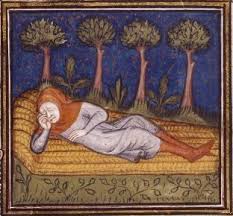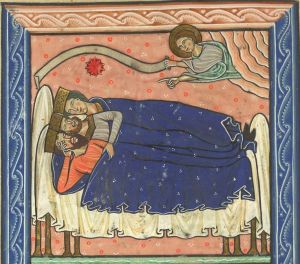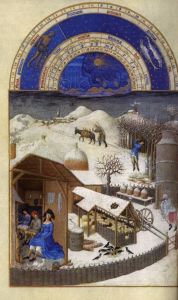Originally posted by Renee Scattergood:
Its been a while since I put up a cat video, so here they are...
Just because!
Just because!
Your spot for news, author spotlights, awesome book deals and giveaways and everything else speculative fiction!

 What you wore, where you slept, and what you slept on were all related to your social status. The average person in the Middle Ages didn’t have a separate sleeping area. In a one room cottage, everyone slept crammed in together on thin woven mats, or mattresses stuffed with wool, hay or moss. Fleas, lice, and other pests were frequent, unwelcome guests that plagued commoners and kings alike. They were sometimes combated with ticking (tightly woven mattress covers), herbs that were known to be insect-repellents, or by storing bedding in cedar chests. While the wealthy had the advantage of feather beds and pillows, and fur coverlets, pest were attracted to them. Bed filling was usually only changed once each year.
What you wore, where you slept, and what you slept on were all related to your social status. The average person in the Middle Ages didn’t have a separate sleeping area. In a one room cottage, everyone slept crammed in together on thin woven mats, or mattresses stuffed with wool, hay or moss. Fleas, lice, and other pests were frequent, unwelcome guests that plagued commoners and kings alike. They were sometimes combated with ticking (tightly woven mattress covers), herbs that were known to be insect-repellents, or by storing bedding in cedar chests. While the wealthy had the advantage of feather beds and pillows, and fur coverlets, pest were attracted to them. Bed filling was usually only changed once each year. If you had a bit more wealth, your sleeping arrangements would be more comfortable, but surprisingly not any more private. A real bed, with a mattress and drawn curtains was quite expensive and might be passed down through the family. Though the likelihood of having a separate sleeping room was greater, the whole family would sleep together in one bed, with servants sleeping nearby on straw mats. Guests of the household might also be invited to share the bed.
If you had a bit more wealth, your sleeping arrangements would be more comfortable, but surprisingly not any more private. A real bed, with a mattress and drawn curtains was quite expensive and might be passed down through the family. Though the likelihood of having a separate sleeping room was greater, the whole family would sleep together in one bed, with servants sleeping nearby on straw mats. Guests of the household might also be invited to share the bed. It is generally thought that most medieval people slept without clothes, but period artwork shows a variety of nightly attire. Some slept nude while others wore simple gowns and shirts, or even just their daily underclothes. Monks were known to sleep in their robes for warmth since they always slept alone. By the late Middle Ages nightshirts and nightgowns were common. What was worn depended on one’s means, personal preferences, time of year, and sleeping conditions, and who else was sharing the bed.
It is generally thought that most medieval people slept without clothes, but period artwork shows a variety of nightly attire. Some slept nude while others wore simple gowns and shirts, or even just their daily underclothes. Monks were known to sleep in their robes for warmth since they always slept alone. By the late Middle Ages nightshirts and nightgowns were common. What was worn depended on one’s means, personal preferences, time of year, and sleeping conditions, and who else was sharing the bed.
 Two years have passed since her willing return to the DSD, and Wynter Reeves is no longer the timid girl who only wanted to blend in. Strong, confident, and in control of her once debilitating powers, the world trembles at her feet while news of what she’s capable of spreads like fire among the State’s enemies. As the death toll rises and Dr. Richter further warps her into a weapon of war, Wynter is forced to embrace the daunting reality of what she’s become. With the remnants of her humanity hanging on by a shoestring, she must choose between the one sacrifice that could lead to her salvation or the dark path of destruction from which there can be no return.
Two years have passed since her willing return to the DSD, and Wynter Reeves is no longer the timid girl who only wanted to blend in. Strong, confident, and in control of her once debilitating powers, the world trembles at her feet while news of what she’s capable of spreads like fire among the State’s enemies. As the death toll rises and Dr. Richter further warps her into a weapon of war, Wynter is forced to embrace the daunting reality of what she’s become. With the remnants of her humanity hanging on by a shoestring, she must choose between the one sacrifice that could lead to her salvation or the dark path of destruction from which there can be no return.What do you love about the genre you write in most often?I've loved fantasy for as long as I can remember. Its been so long, I can't even remember what got me hooked.
 There is no doubt that the seasons ruled medieval life, dictating what work needed to be done and what food was available to eat, but did you know they affected sleep habits as well? With our ability to brighten up stores, homes, and streets with electric lights, our modern-day sleep patterns don’t change a whole lot with the seasons. Most of us aim for a solid 8 hours and adjust our bed times and alarm clocks accordingly.
There is no doubt that the seasons ruled medieval life, dictating what work needed to be done and what food was available to eat, but did you know they affected sleep habits as well? With our ability to brighten up stores, homes, and streets with electric lights, our modern-day sleep patterns don’t change a whole lot with the seasons. Most of us aim for a solid 8 hours and adjust our bed times and alarm clocks accordingly. According to historian Roger Ekirch, medieval adults broke up their sleep into two parts, with a time of wakefulness in between. They might use this time for intimacy, prayer, study, light household chores, or even visiting neighbors. After an hour or two, they would go back to bed until the sun rose. This was common practice for everyone, including monks, who were required to get up in the middle of the night as part of their prayer rituals. This was thought to protect the monastic community and its surroundings from demonic attacks. Children were the exception to the “first and second sleep” norm, and it was recommended that they sleep straight through the night.
According to historian Roger Ekirch, medieval adults broke up their sleep into two parts, with a time of wakefulness in between. They might use this time for intimacy, prayer, study, light household chores, or even visiting neighbors. After an hour or two, they would go back to bed until the sun rose. This was common practice for everyone, including monks, who were required to get up in the middle of the night as part of their prayer rituals. This was thought to protect the monastic community and its surroundings from demonic attacks. Children were the exception to the “first and second sleep” norm, and it was recommended that they sleep straight through the night. During the winter months the shortness of the days, and lighter workloads, allowed abundant opportunity for sleeping, but summer was quite different. Field labors in the heat of the sun were more intensive, and exhausting. Under the feudal system, people were required to first labor for their lord or king before they took care of their own fields and gardens. This made for very long, back-breaking days that didn’t always leave enough time to sleep, especially in the northernmost areas of Europe. The remedy? Afternoon naps.
During the winter months the shortness of the days, and lighter workloads, allowed abundant opportunity for sleeping, but summer was quite different. Field labors in the heat of the sun were more intensive, and exhausting. Under the feudal system, people were required to first labor for their lord or king before they took care of their own fields and gardens. This made for very long, back-breaking days that didn’t always leave enough time to sleep, especially in the northernmost areas of Europe. The remedy? Afternoon naps.